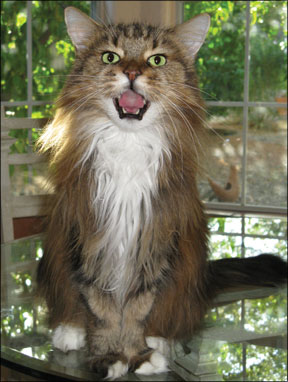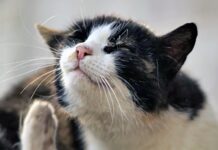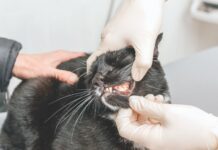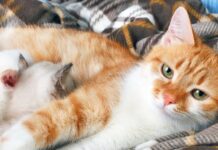Dear Elizabeth: Help! My cat Deckers yowling is keeping me awake at night. I am truly desperate for a good nights sleep!
I can certainly sympathize with your need for sleep. Decker may be keeping you awake at night due to medical or behavioral reasons. Without more background information, I dont know which is likely to be responsible in your case, so Ill discuss several possibilities in the hopes that I hit upon the cause behind Deckers insomnia. In the meantime, you should schedule an appointment with your veterinarian.
May I ask Deckers age? If he is an older cat (lets say over the age of eight), several medical conditions may be involved. The first – and most common disease to consider – is hyperthyroidism, a condition in which the thyroid gland produces excess thyroid hormone leading to a myriad of problems. The classic symptoms of

288
hyperthyroidism include unexplained weight loss and increased appetite, but some hyperthyroid cats have a decreased appetite.
Other symptoms occur in some – but not all – hyperthyroid cats and may include vomiting, excessive thirst and urination, diarrhea, an unkempt haircoat and hyperactivity. Excessive thyroid hormones also have an effect on the heart, causing an increased heart rate. Some cats develop a heart murmur and others may have elevated blood pressure. Without treatment, hyperthyroidism is often fatal, so a complete physical exam and a blood test looking for increased thyroid hormone (T4) should be your first step in determining whats causing Decker to yowl at night.
Help for Hyperthyroidism
Treatment options include medication, administration of radioactive iodine to destroy the overactive thyroid tissue or surgical removal of the thyroid gland. No one really knows what makes hyperthyroid cats prone to nighttime yowling, but most hyperthyroid cats will cease the yowling once their thyroid levels are brought back to normal. If not, or if a blood test did not implicate hyperthyroidism in the first place, the search for a cause must continue.
Hypertension (high blood pressure) is another cause for nighttime yowling and can be diagnosed by measuring blood pressure. As you might imagine, some cats become nervous when the blood pressure cuff is put on their leg (I practically jump out of my skin when the cuff is inflated!), so repeated measurements are often necessary to get an accurate reading. Your veterinarian will also perform an eye exam since hypertension can cause changes in the retina, and will look for an underlying cause of hypertension (usually kidney disease or hyperthyroidism). Medication to reduce blood pressure can be prescribed and often eliminates nighttime yowling.
Cats over 11 years of age may develop senile dementia. Signs may include disorientation, forgetting previously learned behaviors (like using the litter box), anxiety, decreased responsiveness and alterations in their sleep-wake cycles complete with nighttime yowling. Physical examination and blood tests are important in ruling out other medical conditions that may mimic or worsen dementia. While no magical treatment exists for cats with dementia, a quality diet, antioxidant supplements, behavioral and environmental modifications, and perhaps even anti-anxiety medications, may all help to slow the progression of dementia.
Elderly cats may also experience night blindness or deafness, both of which may contribute to nighttime yowling. In the case of night blindness, night lights may help.
In younger cats, behavioral issues usually are responsible for excessive night-time activity. Many indoor cats are left alone during the day while their humans are at work. When their people come home, pressing issues like preparing meals and helping kids with homework may prevent owners from spending much time with their kitties. The cat is usually fed a big meal early in the evening, which lulls the cat to sleep. After a few hours, the cat wakes up refreshed and eager for attention. If his people have gone to bed, some plaintive yowling may awaken them and reinforce the notion that yowling brings attention, or sometimes even food if the desperate-for-sleep owner thinks that the cat is hungry and will go back to sleep if a snack is provided.
You can see how this easily becomes a vicious cycle, with the cat causing more disruptions and the owner, desperate to appease the cat and get back to sleep, giving the cat whatever the owner thinks the cat is demanding. The cure involves extra attention and increased activity during the day and early evening, perhaps a snack before bedtime (but remember to reduce amounts fed at other meals) and then an absolute refusal to give in to demands made during the night. This may require great will power, especially if the unwanted behavior has been reinforced over a long period of time. If Decker is a young cat, and you would like details on getting him onto a more appropriate schedule, please do write again.
Ill be keeping my paws crossed for a full nights sleep for you and Decker! Love, Elizabeth.



